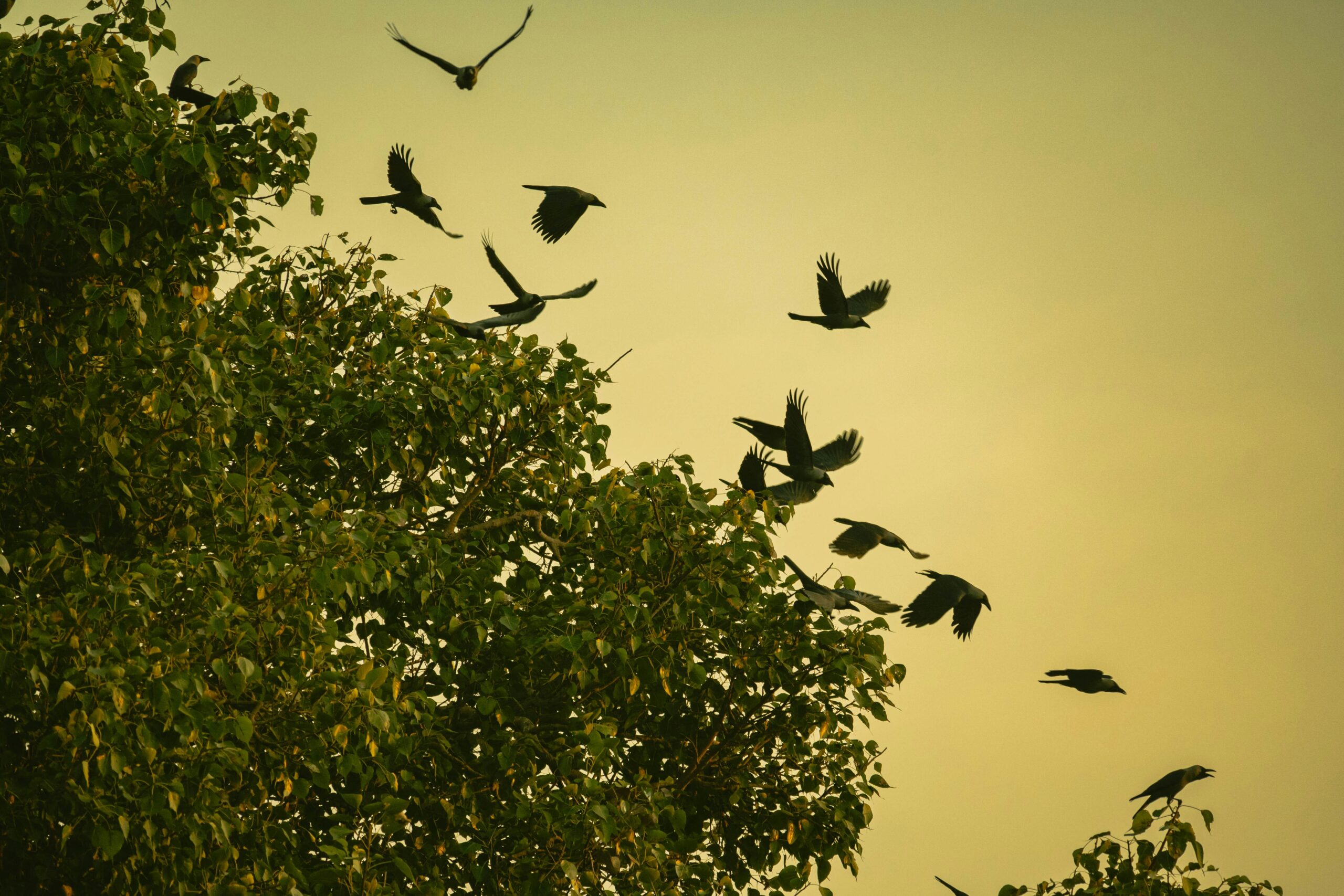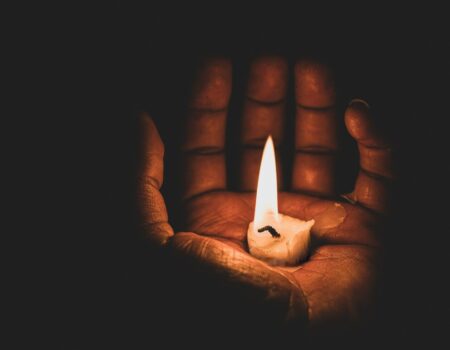CHARACTERS
- The Minstrel
- Atulegwu
- Nne-Adaka (Atulegwu’s wife)
- Adaka (their son)
- Palace Guard
- Mr Kingston (white man)
The minstrel had been walking since the day dawned. The soles of his feet had scorched under the hotness of the sun-beaten Earth, but he kept walking, without purpose. He had stopped at a widow’s house, where he was fed roasted yam. Something was chasing him. It was not a human, neither was it a ghost. It was something far greater. It was something in him. And a man can run from many things except the one that coexists in him. It was an Eke day, but the sun was lingering in an unusual position. It hid beneath the clouds, as though it was shying away from the gaze of the world. The minstrel knew it was an omen. Something was destined to happen. The world was oblivious of this, but to him, the destiny of the world was his destiny. A few distances away, he was approaching a compound. His eyes were not clear. The influence of the booze in the crook of his armpit held him in ecstasy. He was about to fall asleep on a grassy path, when he heard a loud bang. It was accompanied by the jazz of birds fluttering away from trees. He stood and began walking towards the compound. His soul was troubled with a vision as blurry as a morning sky.
*
In the outskirts of a large obi, fenced with dry bamboo sticks that had shriveled under the influence of several harmattan seasons, a muscular youth is seen squatting on the ground. He is cracking tiny pebbles of dry palm-nut shells on a hard pillar of stone. Some of them break open to reveal well-rounded nuts, while some squash themselves, revealing the earthen whiteness of the nut. He puts the unbroken nuts in an oval earthen dish while chewing the broken ones. Later, he carries the dish of unbroken nuts to his father, a man around his late forties. His name is Atulegwu; a name as mysterious as the appearance of the man himself, as he sat on a wooden stool outside the main hut, peering at the sun as it sank into the oceans of the western horizon. Atulegwu wore the look of a disturbed man. Something boggled him and it showed in his repeated scratching of the beards under his chin, the grinding of his teeth, and the way his eyes wandered across the sky as though it were being motioned by a bird. He remained indifferent even after his son had placed the neat bowl of nuts before him. He picks one and throws it into his mouth. One could hear the fruity grinding of the innocent nut.
Atulegwu
Nnam, you have done well. Our people say a male child is like an Ube tree. Its sumptuous fruits fall to the planter when it has grown. But what would I tell our people when my own Ube tree has defiled their proverbial wisdom by bearing fruits even when it is still a seedling, eh kwa?
Adaka
But I am only the son of my father.
Atulegwu
The mouthpiece of wisdom has broken another kola of insight. It is true, my son. I raised you well. Ngwanu, go. Tell your mother the evening sun is finally departing. Will she leave her husband to the lone departure of the light?
(Adaka swiftly rushes into the backyard of the main Hut. A dark woman, clothed in a sequined wrapper which revealed parts of her gorgeous breasts appears. Her face is clouded by soot from the fireplace. She carries a small stool and sits close to her husband, holding a speckle of teasing laughter. One could see the radiant tenderness and peace in their homefolk. Not many families in the whole of Oguashi could boast of it. Atulegwu knew to raise a family like a chief priest knows to communicate with the gods.)
Nne-Adaka
My husband, the virgin amour of my life. The one who understands the sweet language of palm trees. The greatest palm wine tapper in the whole of Oguashi. My pillar—the holder of a thousand rain beaten rocks. The one who outruns all men in a race of elegance. May your days be long, onye nwem. (Smiles to the riddance of her own words.)
Atulegwu
(Beaming with smiles) The youthful woman of beauty, what earns me these titles today? Has the fashion lady remembered that her pot of jewelry must be replenished?
Nne-Adaka
Anh anh, can a proud wife no longer praise her husband?
Atulegwu
The praised one should be wary of the needs that fuel his praises.
Nne-Adaka
It is just that I am done with the meal, my husband. Do we stay and watch the starry night, or is it a good time to appease the townsmen of hungerland?
Atulegwu
Let us watch the night, my jewel. The townsmen are struggling with their map. (A brief silence falls.) Talking about maps, I hear our king has agreed to offer those sun-men a piece of land, Ọ-bụ eziokwu? You know I barely have enough time for village matters.
Nne-Adaka
It is true, Dim. And I even hear that the men are making a predatory job out of it. Nee Metu says they demanded her land, and the king, that brain-ridden autocrat, gave it to them. Like the fool that he is.
Atulegwu
Mba, remove spit! I say vomit those words! No matter how evil a man is, the youngling must respect him as long as there is the existence of those white tufts of hair atop his head, inukwa?
Nne-Adaka
An evil man is an evil man, and age should never justify the potency of his evil. Dim, I think this is where we mouth and forget the taste of it, for nothing will ever compel me to accord one strand of respect to that wasted man. Mbanu!
Atulegwu
You know, our people say a child should be wary of the first hairs growing from their buttocks, for it does not mean it is now capable of accommodating something. Nne-Adaka, you can never count all the birds in the sky. The wisdom of the Earth is too saged for your feminine understanding. Listen to me…
Nne-Adaka
Mba mba, dim, ịbịakwa ọzọ. It is this same wisdom of the Earth that has turned men into carcasses of inaction. Even the birds do not perch in one place for too long. The Earth is not stagnant Dim, the Earth learns. It discovers. And we are the Earth Dim, we decide what we want…
(As she is still talking, a group of men, led frontly by a white, gleaming man and a palace guard emerges from the distance. The white man is vaguely mapping the land on which Atulegwu’s compound sits with his hands. The palace guard and the group of men, hunter guns sledged over their shoulders, nod to the rhythms of his words. When he is done, they begin to approach Atulegwu and his wife as they stare in amazement.)
Atulegwu
Kedu, where is this boy? Adaka! Bring some stools for our visitors. The evening is still pregnant with more happenings.
Palace Guard
No no, Odogwu Atulegwu, we do not plan to stay for long. The night is already here so we must make chance for the things that can rest to rest. Our news, fortunately, is very brief.
Mr Kingston
(In high-pitched, nose-toned voice) Onyeishi, The High Commission has demanded that we use this land of yours to build the newly commissioned church as part of the Oguashi parish project. According to the blueprint, and the proximity of your land to the greater populace, we had no other choice than to agree that in remuneration with thirty bags of cowries, we will take your land, this land on which we stand.
Palace Guard
In order words Odogwu, we demand that you and the rest of your family vacate your house after two more Eke market days. The king will see to it that you are duly rewarded for your foreseen patriotism.
Atulegwu
(In a mild, suppressed voice) I have heard you. Anugom. It is imperative to note that this land of mine is a piece of ancestral identity that has traveled from the long, historic strides of my fathers and has fallen into my inheritance. It will be hard to give up this place I have dreamed of expanding for my own children, but if this is what the king wants, who am I to rebel, eh kwa? The will of our king is the rule of our land after all.
Nne-Adaka
Mbanu! (She yells defiantly, squeaking her fingers) Dim what are you saying? You stand there like one water-soaked log to tell me that without much ado you have already consented to the peevish wills of these egocentric charlatans? Mba, ọmámme! I did not come into this world with my nose smearing the ground. Tufia! May the gods smite me dead before I let myself rot in silence. They say wisdom lies in the masculine end, but I now know it is only with regards to the percussion of bedtime. Even you utuocha, (she fingers menacingly at the white man) you should have come during the daytime, so the sun can give a very responsible smiting.
(As Nne-adaka displays her defiance, pointing her fingers to the faces of the guards, one of them raises his hand to slap her but Atulegwu intercedes, holding the guard’s hand up in the air. The white man has distanced from the fueling convergence)
Atulegwu
Ndị nkem, I have told you, go and tell the king that we will give heed to his demand. We are not rebels. Forget her rantings. I know… (As he is still speaking, Adaka emerges from the room. His head is rounded with a glowing strand of palm leaf and a Cutlass waving in his right hand. His gait heaves with such neolithic charm that the tuggle quietened.)
Adaka
There is a looming proverb that is only prominent in the land of the dead, that between the oppressor and the oppressed, there is a young child who has been staring. Now that child, descendant from a long history of oppression is ready to stare no more. You all impotent men without any sense of independence (pointing at the guards,) weaklings of shameless virtue, I demand you to go back to wherever you escaped. (His voice rises with a triumphant sombre) Build your churches wherever may please you, but you see this land, you must fall me—Adaka, the son of the soil, before you can have it. Inukwa!
Atulegwu
Lekwa, Adaka, I have told you countless times to keep away from matters of the…
Palace Guard
Who brings a cutlass in a battle of guns? See, boy, do not look death in the face and ask what it can do. (Pointing towards Adaka’s chest.) The one I will give you will pierce your heart. Listen to your old man and pack your bags…
Adaka
A battle of guns? Guns from where? Your foreign guns cannot pierce my native soul nwokem. You who have forgotten that we are all Alusimakwa—gods skinned in human flesh. See how you reek of forgotten history. See…
Nne-Adaka
Biko biko, Adaka my son, chelu chelu, this is not how I raised you. Go and keep the knife. It is guns that these people wield, not toys. You are my child not a gun silencer.
Adaka
Nnem chelu, you wombed and birthed me but I have the blood of my ancestors running in my veins. Today, I will show these imbeciles that they can never kill what is beyond death. Rapum, kam bee fa ka anụ!…
(The palace guard cocks his gun in readiness to fire. Adaka smites his Cutlass on the hard ground. Atulegwu and his wife scampers into the hut with the wife dragging Adaka by his wrapper. Adaka’s wrapper withdraws to reveal a small piece of loin covering his waist side. His legs thump with agility as he makes to plunge headlong into the battle. A loud bang goes off to the heavens. The birds flutter wildly as they fleet from the trees. The air is filled with the jazz of scampering feet. alongside the piercing sound of a cutlass scratching the Earth.)
*
The compound is filled with smoky haze. Silence lingers with a distant piercing. Beyond the palm trees, a group of birds circle around, at the peak of the rising smoke. The fearless minstrel wanders through the leg-cleared path outside of Atulegwu’s compound. He is the seer that went rogue with the gods. The story goes that his father and the fathers before him were faithful devotees of Alusiigede, the strong black god that won the last war for the people of Oguashi during the ancient times. The minstrel had converted to Christianity and had tried to live in the city, away from the traditional ways of his ancestors, but he never knew peace. The gods haunted him. He spent years and years wandering aimlessly in the city, until he finally became addicted to booze and returned to the village. He now goes around staggering from forest to forest, from house to house, prophesying to the villagers. He survives on the little thanksgivings he receives from those he divined for. As he staggered past Atulegwu’s house, he sang spasmodically, his voice ricocheting around the kaleidoscope of the thick silence.
One star departs, another rises
One woman loses her child
Another carries belle
One man runs away from his duty
A village is condemned to fear
It is how the legend goes
It is how history is made
gwam, show me a crying woman
And I will show you a dead child
Even me, what I am running from is chasing me
What I am looking for is staring at me
But our eyes are open with blindness
Our bones are strong with weakness
Our minds are hopeful with fear
Chukwu, give me more booze
So I can wait out the rest of these days
So I can sit through the going and comings
Of our ancestors, and
Watch them die in every uprising.
Chimezie Umeoka
Chimezie Umeoka is an emerging writer from Aba, Nigeria. He has appeared in several publications and anthologies and has edited the first student journal in West Africa, The Muse Journal. Including several other awards, Chimezie has been a finalist for the ZODML Poetry Prize and winner of the 2024 Pengician Chapbook Awards. He is the author of the poetry chapbook, MOONCHILD. Chimezie is presently undergoing his undergraduate studies at the English and Literary Studies department in the University of Nigeria, Nsukka. He is the Chief Custodian of The Writers' Community, UNN.




